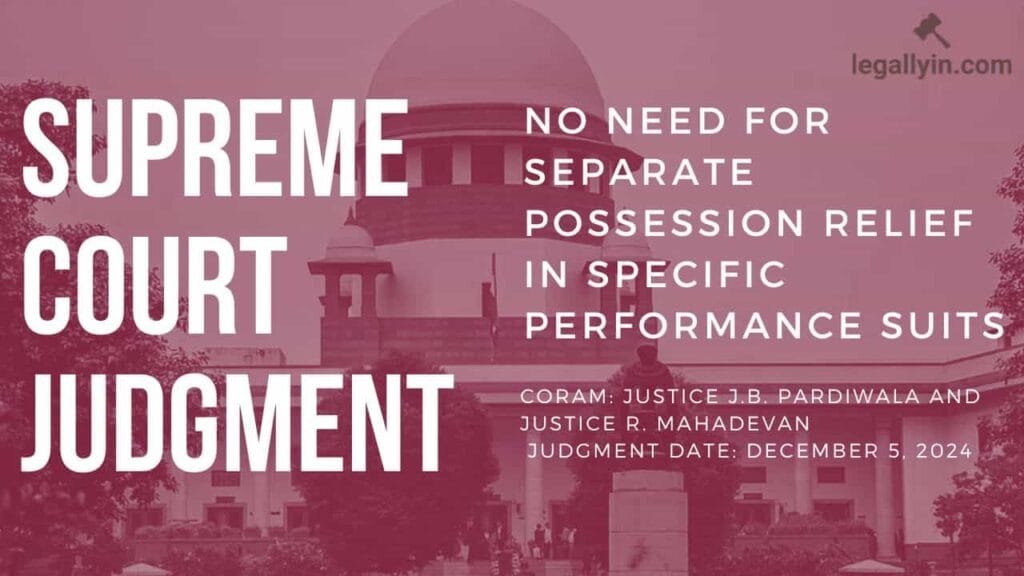Relief in specific performance suits is crucial in resolving property disputes and enforcing agreements to sell. Recently, the Supreme Court of India clarified an important question: does a plaintiff need to ask for possession separately in a suit for specific performance, or is it implied in the agreement?
Case Title: Avinash Ramachandra Marathe v. Anand Arvind Chougule and Ors.
Court: Supreme Court of India
Coram: Justice J.B. Pardiwala and Justice R. Mahadevan
Judgment Date: December 5, 2024
Background of the Case
The appellant filed a suit in Delhi for specific performance of an agreement to sell immovable property located in Gurgaon. The Delhi High Court dismissed the suit on the grounds that it was not maintainable in Delhi, holding that the court lacked jurisdiction under Section 16 of the Code of Civil Procedure, 1908 (CPC). The High Court also observed that no separate relief for possession had been sought under Section 22 of the Specific Relief Act, 1963 (SRA), reinforcing its stance that the suit had to be filed in the court where the property was located aggrieved by the High Court’s decision, the appellant approached the Supreme Court.
Issues Before the Court
- Jurisdictional Issue:
Whether a suit for specific performance of an agreement to sell immovable property can be filed in a court where the defendant resides, or must it be filed in the court having territorial jurisdiction over the property as per Section 16 CPC? - Separate Relief for Possession:
Whether the plaintiff is required to specifically claim a separate relief for possession under Section 22 of the SRA when the agreement to sell implicitly includes possession upon execution of the sale deed.
Arguments of the Parties
Appellant’s Arguments:
- Jurisdiction Argument:
The suit was not seeking possession of the property but rather sought specific performance of a contractual obligation. Hence, under the proviso to Section 16 CPC, the suit could be filed in the court where the defendant resided. - No Separate Relief for Possession:
The appellant argued that the agreement to sell implicitly provided for possession to be delivered upon execution of the sale deed. Therefore, there was no need to claim a separate relief for possession under Section 22 of the SRA.
Respondent’s Arguments:
- Jurisdiction Argument:
The respondents contended that the suit effectively sought possession of the property, even if not explicitly claimed. As such, it had to be filed in the court having jurisdiction over the property, as mandated by Section 16 CPC. - Possession and Relief Under Section 22 SRA:
The respondents maintained that a separate claim for possession was necessary to grant complete relief. They argued that the absence of such a claim made the suit defective.
Court’s Observations and Reasoning
- On the Requirement for Separate Relief for Possession:
- The Court clarified that under Section 22 of the SRA, a plaintiff is generally required to claim possession if it is not implicit in the agreement.
- However, in cases where the agreement to sell inherently contemplates possession being handed over upon execution of the sale deed, a separate relief for possession is unnecessary.
- The Court relied on the precedent of Babu Lal v. Hazari Lal Kishori Lal and Others (1982), which held that a plaintiff in a suit for specific performance does not need to separately claim possession if the agreement implicitly includes the right to possession.
- Jurisdictional Issue:
- The Court analyzed Section 16 CPC, which mandates that suits involving immovable property be filed in courts within the property’s territorial jurisdiction.
- It noted that the proviso to Section 16 CPC allows suits to be filed in the court where the defendant resides if the relief sought is personal in nature (e.g., enforcement of a contract without requiring possession).
- The Court held that since the relief sought by the plaintiff was to enforce a personal obligation under the agreement, the suit could be filed where the defendant resided.
- Judgment of the Delhi High Court:
- The Supreme Court found that the High Court had erred in dismissing the suit for lack of jurisdiction, as the case involved enforcement of a personal obligation rather than delivery of possession.

Key Points of the Judgment
- Separate Relief for Possession:
- Not required if the agreement implicitly includes possession upon execution of the sale deed.
- Section 22 SRA does not mandate a separate claim in such circumstances.
- Jurisdiction Under Section 16 CPC:
- Suits for specific performance of agreements to sell immovable property can be filed where the defendant resides if no explicit relief for possession is sought.
- Reiteration of Precedent:
- The Court reaffirmed the principles laid down in Babu Lal v. Hazari Lal Kishori Lal and Others (1982) regarding implicit possession in agreements to sell.
Conclusion and Final Decision
- The Supreme Court set aside the judgment of the Delhi High Court, holding that the suit was maintainable in Delhi.
- The Court remanded the matter to the trial court for consideration on merits.
Significance of the Judgment
This decision has significant implications for specific performance suits, particularly in clarifying:
- When possession can be considered implicit in an agreement to sell.
- Jurisdictional principles under Section 16 CPC for suits involving immovable property.
Key Takeaways for Law Students and Practitioners
- Possession Relief: A separate claim for possession is unnecessary if possession is implicit in the agreement to sell.
- Jurisdiction Flexibility: Specific performance suits can be filed in the jurisdiction where the defendant resides if the relief sought is personal and does not include possession.
- Relevance of Precedents: Babu Lal remains a cornerstone for interpreting specific performance suits under the Specific Relief Act.
